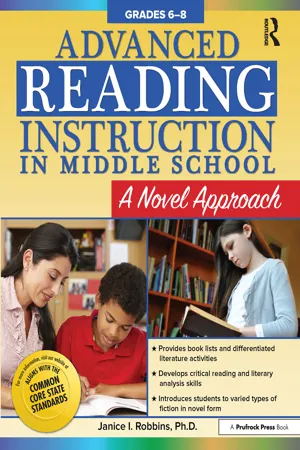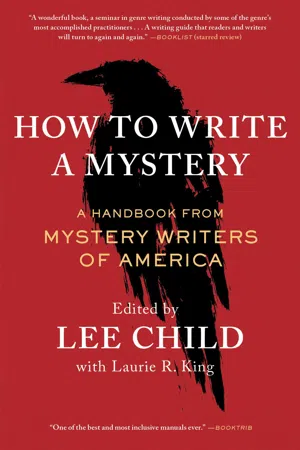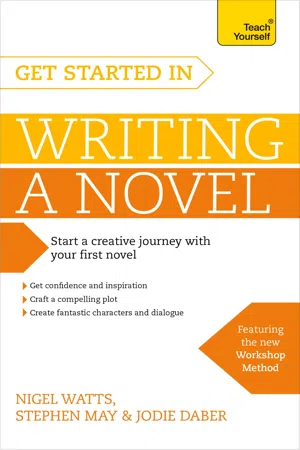Mystery Novels
Mystery novels are a genre of fiction that typically involve a crime, its investigation, and the process of solving the mystery. These novels often feature a detective or amateur sleuth as the protagonist, and they are known for their suspenseful and engaging plots. The genre has a long history and continues to be popular among readers who enjoy puzzles and suspense.
4 Key excerpts on "Mystery Novels"
- eBook - ePub
Advanced Reading Instruction in Middle School
A Novel Approach (Grades 6-8)
- Janice I. Robbins(Author)
- 2021(Publication Date)
- Routledge(Publisher)
...Chapter 9 The Mystery Novel DOI: 10.4324/9781003232902-10 The most beautiful thing we can experience is the mysterious. It is the source of all true art and science.—Albert Einstein Mystery Novels may present a crime to solve or a puzzling situation. The intrigue may be physical or psychological, full of action and adventure, or mind-bending and perplexing entanglement. Some Mystery Novels may follow a path of logical thinking while others offer twists and turns and "I never saw that coming" endings. What all mysteries have in common is a confounding situation that requires resolution. Quite often the situation is a crime that must be solved or a matter of political intrigue or deception. Some writers of Mystery Novels enjoy having the reader play along with them, inserting clues along the way to entice the reader, and encouraging logical thinking to solve the mystery. Some mystery writers enjoy offering readers suspenseful, thrilling experiences that do not follow a straight path of clues. When well-written, both types of novels appeal to most gifted readers because of the intellectual challenges they present. Mysteries generally have predictable structures, allowing the plot to assume the primary role while characters are secondary. In detective mysteries, there is one skillful crime solver who dominates the scene and is usually the one who uncovers parts of the puzzle in a progression leading to a reveal and resolution of the crime at the end of the novel. Other mysteries may offer a series of actions that are not orderly but move haphazardly toward the resolution of the puzzle or there may be a variation on the two approaches to telling a mystery tale. The most significant and unique teaching opportunity through the use of Mystery Novels is in the area of logical thinking and reasoning with evidence...
- eBook - ePub
How to Write a Mystery
A Handbook from Mystery Writers of America
- Lee Child, Laurie R. King, Lee Child, Laurie R. King(Authors)
- 2021(Publication Date)
- Scribner(Publisher)
...Whatever the case, it’s the suspense that drives the book, the chase, the scramble, and the key question is “What happens next?” Many books are pure mystery, many books are pure thriller—but as you know from your own reading, it’s much more common for a book to have elements of both. Traditional mysteries can be filled with suspense, headlong thrillers can be tied to enigmatic puzzles—there’s your first lesson on how the genres explode. All the subgenres flow from there. Here are just some of them: The crime novel : Some people use this term more broadly to mean any novel involving crime—in the UK, “crime” encompasses pretty much anything in the realms of mystery, thriller, and suspense—but more specifically as a subgenre, it’s a novel more about the criminal than the law enforcer, and often told from the criminal’s point of view. It can be light (Donald Westlake) or grim (James M. Cain) or nestled nicely in between (Elmore Leonard). The police procedural : This is the cop book, whether that cop is alone, part of a team of police, or in an even broader law-and-order network of detectives, medical examiners, sheriffs, ADAs, and the like. The police procedural looks at how a cop solves a crime and sometimes at the protagonist’s home life as well, which is often not a bed of roses. Many great writers inhabit this territory—Ed McBain, Joseph Wambaugh, Michael Connelly, and Don Winslow, just to name a few, plus the classic Scotland Yard cops of Ngaio Marsh, Ruth Rendell, and P. D. James; the Navajo cops of Tony Hillerman; the South African cops of James McClure; and, of course, more Scandinavians than you can shake a stick at (not that I’d advise shaking a stick at them—many, many terrible things happen to the people in Scandinavian crime novels). The hard-boiled detective and noir novels : These are two distinct subgenres, though often inhabited by some of the same characters and tropes...
- eBook - ePub
Get Started in Writing a Novel
How to write your first novel and create fantastic characters, dialogues and plot
- Nigel Watts, Stephen May, Jodie Daber(Authors)
- 2015(Publication Date)
- Teach Yourself(Publisher)
...Although these genres focus on their respective questions, both types of question – suspense and mystery – are to be found in almost all fiction. Suspense and mystery can, of course, be used as cheap tricks, but so too can they be used as the foundation for great fiction. Shakespeare, Dickens, Dostoevsky, Joseph Conrad, Thomas Hardy were all masters of the intriguing question. Key idea A storyteller who believes that depth of theme or brilliance of style excuses him or her from raising questions and delaying their answer may be in danger of the cardinal literary crime: boring the readers. David Lodge ‘A solved mystery is ultimately reassuring to readers, asserting the triumph of reason over instinct, or order over anarchy.’ Workshop Being a discriminating reader is important if we are not to start from scratch. We can learn from other writers, both from their successes and their failures. Think of a favourite story (a book, film or stage play). Write down your answers to the following questions in as much detail as you can. • In what way was it entertaining? Did it offer escape from boredom or anxiety? Was your understanding of the world shaped by the story? • What major question was raised near the beginning of this story? What subsidiary questions did the action generate? • Was the major question one of suspense, or one of mystery? Were both types of question raised in the story? • How much of your pleasure in the story lay in finding the answer to a question? (To remind you of the questions: ‘What will happen next?’ and ‘How did we get into this mess?’) What is a plot? Part of the problem we have with plotting is our lack of clarity about exactly what a plot is. We have read enough books and seen enough films to have an instinct for it, but rarely is instinctual plotting successful. Focus point A novel is like a long journey: unless we are very sure of the route and where we are going, we will probably get lost...
- eBook - ePub
Masterclass: Writing Crime Fiction
How to create compelling plots, dramatic characters and nail biting twists in crime and detective fiction
- Rosemary Rowe(Author)
- 2014(Publication Date)
- Teach Yourself(Publisher)
...But it may be helpful to do a swift analysis and look at the advantages and disadvantages of each, including what makes them hard to sell or easier to write. Key idea Whodunnits are not the only kind of crime novel. Work out which varieties most appeal to you. CRIME MYSTERIES As the term suggests, these are the stories that focus on a puzzle to be solved. They fall broadly into three categories: 1 Whodunnits (which has distinct subdivisions of its own) 2 Howdunnits, and 3 Whydunnits. Whodunnits These are still by far the most widely written and read of all varieties of crime fiction, so much so that many recognized subgenres exist. They differ chiefly in focus, setting, the nature of the sleuth, the tone of the writing and the amount of graphic violence in the text. All, however, have a basic similarity. • Focus: on the puzzle and the mechanics of the crime, which is almost always murder – often more than one. • Sleuth: may or may not be a professional, but is intelligent and/or resourceful. • Solution: arrived at through the application of that intelligence or resourcefulness (not accident or chance). • Cast of suspects: a group of people, any of whom may have done the crime for different reasons, is an essential element of the genre. • Setting: may be anything. The nature of the setting often sets the genre. • Motives : range from the purely personal to political and social motives. There may be more than one person with motive, or no apparent motive for anyone at all (though there will be one – this is not the genre for writing about random killers or psychopaths). Here are the most important subdivisions of the genre. THE CLASSIC ‘DETECTIVE’ NOVEL Willard Huntington Wright (S.S. Van Dine) ‘There simply must be a corpse in a detective novel, and the deader the corpse the better.’ • Focus: the puzzle and the cleverness of the sleuth. The plot is usually complex. • Sleuth: may be a police officer but more commonly a private detective or an amateur...



